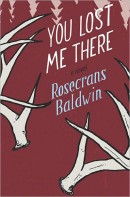 Baldwin’s novel is one of the more widely noticed debuts of 2010. In it, Victor, a leading Alzheimer’s researcher living in Maine, is still struggling to cope with the death of his wife, Sara, who was killed in a car accident three years earlier. Victor’s grief is complicated by the discovery of note cards on which Sara recorded her thoughts about their relationship—thoughts that don’t always match Victor’s.
Baldwin’s novel is one of the more widely noticed debuts of 2010. In it, Victor, a leading Alzheimer’s researcher living in Maine, is still struggling to cope with the death of his wife, Sara, who was killed in a car accident three years earlier. Victor’s grief is complicated by the discovery of note cards on which Sara recorded her thoughts about their relationship—thoughts that don’t always match Victor’s.
In Time Out Chicago, J.C. Gabel says the book’s “clever paradoxical sub-plot” (“Victor is an expert on memory, except when it pertains to his own”) is impressively executed. In the classroom that is Entertainment Weekly, You Lost Me There earns an A- for being “beautiful, brainy, [and] offbeat.”
In the New York Times, Jean Thompson says, “There is a sense in which Victor cannot complete or even begin his mourning until he knows exactly what he lost. Unfortunately for him, verifiable results are hard to find outside the lab. . . . He is the sort of narrator who occasionally moves a reader to sympathy, but just as often makes you want to give him a few good smacks upside the head.”
Michael Schaub’s praise is the most full-throated: “[T]he most surprising thing about You Lost Me There is Baldwin’s self-assured, subtle, and unfailingly moving prose—this book does not read like the work of a young, first-time novelist. [Baldwin] . . . is uncannily perceptive when it comes to the complicated and fraught issues of marriage, death, and sexual desire, and his dialogue is naturalistic and unforced. . . . It’s not always easy to find beauty in pain, but that’s what Baldwin has done, and the result is affecting, profound, and true.”
You Lost Me There by Rosecrans Baldwin
Riverhead, 304 pp., $25.95

